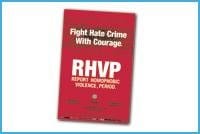Police forces may be encouraging gays to report hate crimes, but even the cops say the courts aren’t using the laws to their full extent.
Tom Decker, the Toronto police LGBT liaison officer, says the classification of an assault as a hate crime often gets changed by the time a case reaches court, meaning no additional time is added to a sentence.
“Often the hate crimes are the first things to get dropped,” he says. “That’s just the way the legal system operates. That whole bargaining, it’s a give and take. As the crown attorney you want to get a conviction. You don’t want to drop the assault but you might be willing to drop the aggravating circumstances.”
The result, say some activists, is that the laws are not very effective as a punishment or a deterrent.
“In terms of sentencing it often times is not,” says Howard Shulman, who runs the antiviolence program at the 519 Church St Community Centre. “A lot of those who who tend to bash tend to be first-time offenders. The courts are loath to put a harsher sentence on first-time offenders.”
Decker headed up the establishment of the Toronto police’s Report Homophobic Violence, Period (RHVP) program which encourages people to report attacks on gay men and lesbians. Police in Peel region recently established a hotline for people to report hate crimes against sexual minorities.
But Decker says that, while police might investigate something as a hate crime, once a case is turned over to the crown it’s out of their hands.
“Any piece of legislation is only as good as its implementation,” he says. “If it’s not prosecuted to the full and if it falls by the side due to plea bargaining, that’s just the reality. That’s just the way the legal system operates.”
Douglas Janoff, whose 2005 book Pink Blood: Homophobic Violence in Canada examined hate crimes, agrees that police can only take hate crimes so far.
“Investigating and prosecuting crimes are two separate issues,” he writes in an email. “Prosecutors cannot claim to be ‘getting tough’ on hate crime if they actually never use the guidelines which were supposed to make the sentences tougher.
“Unless a federal or provincial attorney general’s office or a law school does a very comprehensive analysis of the use of sentencing guidelines for hate crimes nobody will know whether they are effective or not.”
Shulman says he was part of a 2005 working group constituted by the Ontario attorney general to look at hate crimes legislation.
“We put forward that changes should be made to the legislation to make sure that crimes are seen as hate crimes in terms of sentencing,” he says. “We looked for the minister to strengthen sentencing and sentencing guidelines.”
But Shulman says he hasn’t heard of any action taken by the attorney general. Nobody from the Ministry of the Attorney General responded to repeated interview requests.
Shulman says current sentences are sometimes ludicrous.
“We’ve had cases where bashers have called us and said their sentences have included community work,” he says. “That raises safety issues.”
But not everybody sees harsher sentencing as a beneficial move. Marianna Valverde, a professor at the University of Toronto’s Centre of Criminology specializing in sexual orientation and the law, says the laws have no practical effect.
“This provision is important from a symbolic point of view, but in terms of actually being used there are a lot of problems,” she says.
“From my experience with my friends who have been gaybashed, it’s often a drunk 19 year old. I don’t think anyone’s going to say, ‘Oh no, I might get a higher sentence for beating up a gay guy. Let me beat up a straight guy. And putting them in jail would only teach them more homophobia.”
Valverde and Decker say that pushing for harsher sentencing for hate crimes also risks buying into a rightwing view of society.
“There’s a certain way in which these hate crimes fit in with a law and order agenda,” says Valverde.
Decker says the history of the queer community should also lead to caution on pushing for longer sentences as a matter of course.
“You don’t want the courts to get overly harsh on this because then they’ll get overly harsh on other crimes,” he says.
But Shulman says sentencing needs to be toughened.
“I think there needs to be changes in the laws,” he says. “That might be mandatory sentencing or having community input.
“We’ve been trying to have community groups involved. The law allows victim impact statements. That was one of the recommendations of the hate crimes working group, to have those reinforced from a community group, to show the damage it does to the whole community.”
Shulman says strengthening hate crimes sentencing might also encourage greater reporting of attacks.
“Hate crimes are really underreported,” he says. “For every one that comes into us or the police there are nine that go unreported.”


 Why you can trust Xtra
Why you can trust Xtra


